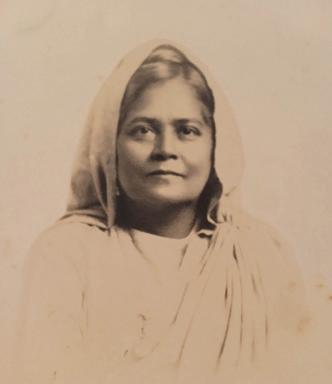
4 minute read
Jamini Sen: A Portrait of our First Female Fellow
As we celebrate the work and impact of Jamini Sen with a new portrait in College Hall, Elaine O’Connor looks back on the life of our first female Fellow.

“I have a lot of responsibilities towards my sisters in my country,” Jamini Sen wrote in her journal. Her desire to keep advancing her skills to support those women eventually led to her admission as our first female Fellow.
Early life
Born in Basanda, West Bengal, India in 1871, Jamini was part of a large, welleducated family. Her father – although supportive of women’s education –didn’t want her to study medicine. But Jamini was determined.
In 1890, she was one of the first women to attend Calcutta Medical College. When she passed her Licentiate of Medicine and Surgery in 1897, opportunities for women doctors were still limited.
Medical practice
This led Jamini to Nepal in 1899, where she became medical advisor and friend to the Rajmata (the King’s mother) and took on supervision of the local hospital. Returning to Kolkata in 1909, she felt her skills needed a refresh to provide women’s essential healthcare.
“The scarcity of female doctors is a major problem in our country,” she wrote in her journal. “Good female physicians are needed for gynecological matters.
“Since my student life, operative surgery and gynecology have progressed a lot, so if I really wish to help my native sisters, I should learn the modern methods.”
This brought Jamini to Europe: first to Dublin, and then to our College.
Meanwhile, in Glasgow...
At what was then the Faculty of Physicians and Surgeons of Glasgow, an ongoing tussle was taking place over admitting female Fellows. At an 1892 meeting, the minutes record the matter as ‘inexpedient’, as no women had yet requested Fellowship.
In 1896, Elizabeth Adelaide Baker’s request was denied. Dr Jessie MacGregor, in 1905, was also denied. Dr Anne Louise McIlroy (the first woman to receive a medical degree from the University of Glasgow) made her request in 1910. After another debate, the regulations were amended so that admission to Fellowship “shall be open to women, equally with men.”
Two years later, Jamini Sen passed the Fellowship exam and became the first female Fellow qua Surgeon of the Royal Faculty of Physicians and Surgeons of Glasgow.

Unfortunately, opportunities weren’t equal – Jamini wasn’t allowed to hold office, and her privileges were restricted compared to the men around her.
Supporting women
After time in Berlin, Germany, Jamini moved back to India, working in several places. At each of her appointments, she noted an increase in the number of female patients attending, and the demand for services. In Agra, she noted in her journals that women came in looking for the “sariwali dactarin” –the female doctor in a saree. “I have served them, and gained their trust,” she wrote.
In Kolkata, a former classmate who had become chair of the Kolkata Municipal Corporation asked her to head up the Baldeodas Maternity House. There, she created a popular service, training nurses and midwives herself and creating a handbook.
In 1929, Jamini’s health suffered, and she moved to the coastal city of Puri to recuperate – but was soon asked to take charge of a female hospital there. Unfortunately, her health did not improve, and she was brought back to Kolkata, where she died on 22 January 1932.

About the artist
Grace Payne-Kumar created our new portrait of Jamini Sen, which is now displayed in College Hall. Grace was born
in Hong Kong to a British Asian family. Her grandmother’s family are from Dunbartonshire, Scotland. She studied art at the University of Edinburgh. Grace’s style is inspired by Old Masters, and she sees representation as an important focus for her work in portraiture.

Interested in reading more?
Our Admitting Women blog series, published in 2021, gives an in-depth look at the changes which brought the first women into our College.
rcp.sg/firstwomen
References
Ray, S. 2014, ‘Women Doctors’ Masterful Maneouverings: Colonial Bengal, Late Nineteenth and Early Twentieth Centuries’, Social Scientist, vol 42, no 3 / 4, pp. 59–76.
Ray, S. 2021, ‘The Elusive Science: Medicine and Women in Late Colonial Bengal’, postScriptum: An Interdisciplinary Journal of Literary Studies, vol VI, no i, pp. 14–28.
Sanyal, I. 2024, ‘Dr. (Miss) Jamini Sen (1871–1932): A pioneer woman doctor of colonial India and the first female Fellow of the Royal Faculty of Physicians and Surgeons, Glasgow’, Sci. And Cult, vol 90, pp. 3–13.
RCPSG, GB 250 1/1/1/13, Faculty Minutes, ‘Admission of Women to the Fellowship’ (3 Oct 1910) p. 261










